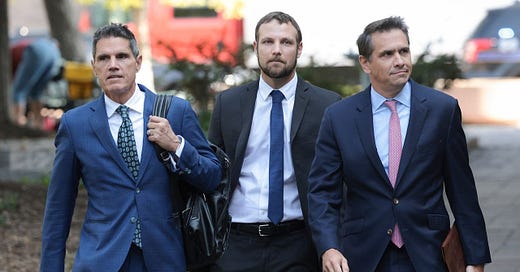
The Trump Trials: Overview
Introduction
As the 2024 presidential election looms large, former President Donald Trump continues to face an unprecedented legal battle on multiple fronts. His defence team, led by attorneys John Lauro and Todd Blanche, is navigating a complex web of legal proceedings, with special counsel Jack Smith pressing charges in various cases ranging from election interference to classified document mishandling. This article breaks down the latest developments in these trials, including the intricacies of presidential immunity and the contentious role of key legal figures.
1. Legal Chess in D.C.: The Presidential Immunity Debate
The crux of the D.C. election interference case rests on a broad new interpretation of presidential immunity. Trump's lawyers are seeking to limit which actions can be prosecuted, arguing that many fall under the category of official acts. Special counsel Jack Smith, on the other hand, maintains that Trump’s actions were private, thereby subject to prosecution. The decision will ultimately rest with U.S. District Court Judge Tanya S. Chutkan, whose ruling will likely be appealed to the Supreme Court.
This case exemplifies the tug-of-war between safeguarding the actions of a sitting president and holding public officials accountable for alleged misconduct.
2. Delays in Florida and Georgia: Appeals Court Gridlock
Beyond D.C., the legal saga extends to Florida and Georgia. In Florida, Trump faces charges related to mishandling classified documents. District Judge Aileen M. Cannon controversially dismissed this case, arguing that Jack Smith’s appointment as special counsel was unlawful. The U.S. Court of Appeals for the 11th Circuit is now tasked with addressing this legal quagmire.
Meanwhile, the state election interference case in Georgia remains entangled in appeals. With the presidential election only weeks away, it is increasingly unlikely that either case will see significant progress before voters head to the polls.
3. Smith vs. Cannon: Judicial Tensions Rise
One of the most contentious aspects of Trump's legal troubles has been the role of Judge Cannon. Smith has not moved to disqualify her from the Florida case, but many legal analysts argue that her decisions have been unusually favourable to Trump. Despite these criticisms, disqualifying a federal judge remains a high bar. Boston College law professor Jeffrey M. Cohen suggests that appellate judges might prefer to issue a stern rebuke in their written opinion, rather than remove her from the case altogether.
4. The Appendix Controversy: What’s at Stake?
A significant point of contention in the D.C. case is Smith's appendix — an extensive document that includes sensitive material, such as transcripts of witness interviews. Trump's legal team argues that releasing this information publicly could have political ramifications, while Judge Chutkan has indicated her willingness to unseal it. This appendix may provide valuable insights into the prosecution’s evidence, but it also raises questions about transparency versus fairness in such a high-stakes trial.
5. Trump’s Legal Future: What Happens if He Wins?
Should Trump win the 2024 election, the fate of these legal battles could take a dramatic turn. Trump would likely push for his Justice Department to dismiss the federal charges against him, including the D.C. election interference case and the appeal of the Florida classified document case. However, his presidency would have no bearing on the state election interference charges in Georgia, as federal jurisdiction does not extend to state-level prosecutions.
While it is unlikely that a sitting president would face trial, these cases could resurface at the end of his potential second term in 2029.
6. What If Trump Loses? The Long Road Ahead
If Trump loses the election, the federal cases would continue, barring any intervention from the succeeding administration. Appeals in both the D.C. and Florida cases will take time, meaning that even in the event of a loss, Trump may not face a trial until 2025 or beyond. The U.S. Supreme Court will likely play a pivotal role in determining whether Trump can be prosecuted under its revised interpretation of presidential immunity.
7. Questions from the Public: Voting Rights, Legal Loopholes, and More
Amid the complex legal landscape, questions from the public continue to pour in. One commonly asked question is whether Trump, convicted of state crimes in New York, can still vote. Under Florida law, Trump retains his right to vote, as his convictions were outside the state and did not involve imprisonment.
Another recurring question relates to Georgia’s District Attorney Fani T. Willis. Even if she steps aside from the election interference case, legal experts agree it would not likely expedite proceedings, given her office's role in overseeing the investigation and indictment.
Summing Up
The Trump trials represent an unprecedented convergence of legal, political, and constitutional questions. As the cases move slowly through the appeals process, they continue to capture the nation’s attention. Whether Trump wins or loses the upcoming election, his legal battles will remain a central issue, shaping not only his political future but also the broader dialogue surrounding presidential power and accountability.



